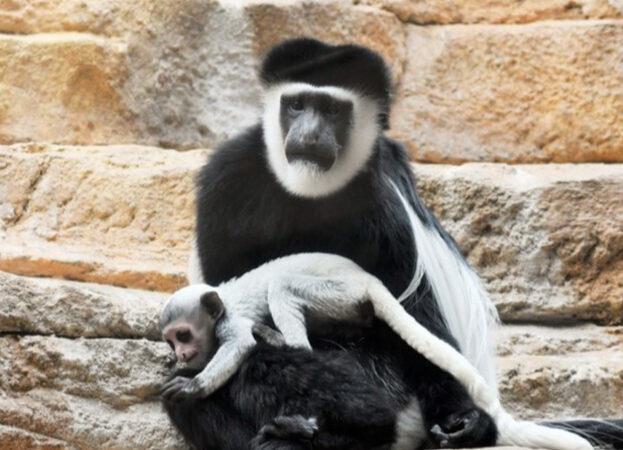The name continues a theme of tree-related names that Juniper shares with siblings Willow, Hawthorn and Teak.
The birth is part of the Association of Zoos and Aquariums Colobus Species Survival Plan, a conservation breeding program to manage a genetically healthy population of Guereza colobus monkeys in North American zoos. Since 2011, there have been 10 successful colobus births at the Saint Louis Zoo.
Colobus infants are born with all white hair and a pink face. In contrast, adults are primarily black, with white hair encircling their faces and half of their tails and a distinctive mantle of long white hair around their shoulders and backs. An infant's hair coat will change gradually until they reach adult coloration at about 6 months old.
Colobus mom Cecelia, 21, is the dominant female in the group of four males and four females. The experienced mother of six is taking great care of her newborn. Baby Juniper will stay with mom for nursing and sleeping, but all of the females in a colobus family will take turns holding and carrying the infant when mom is busying eating or socializing. The father, Kima (KEE-muh), 15, can be seen watching over his family and interacting with the youngsters.
"The new baby adds so much to the dynamics of the colobus group," said John Velasco, Primate Keeper, Saint Louis Zoo. "One-year-old Teak, previously the youngest in the group, is gaining more independence from the comfort of his mother, Cecelia, now that she's also caring for an infant. The others in the group are learning how to care for a baby, as they mimic behaviors of mom and older female siblings, Binti and Willow."
The Guereza colobus monkey can be found throughout the forests of central Africa. Although fairly abundant in the wild, this species is increasingly threatened by deforestation for timber and loss of habitat to plantations and agricultural land, as well as illegal hunting. People can help protect the colobus monkey and other wildlife with some simple steps: reduce, reuse, recycle — in that order; use Forestry Stewardship Council (FSC) Certified wood and paper products, and use rainforest-friendly coffee, such as Rainforest Alliance Certified.


